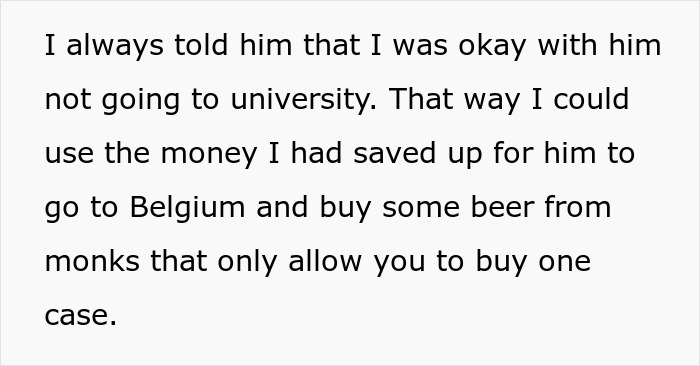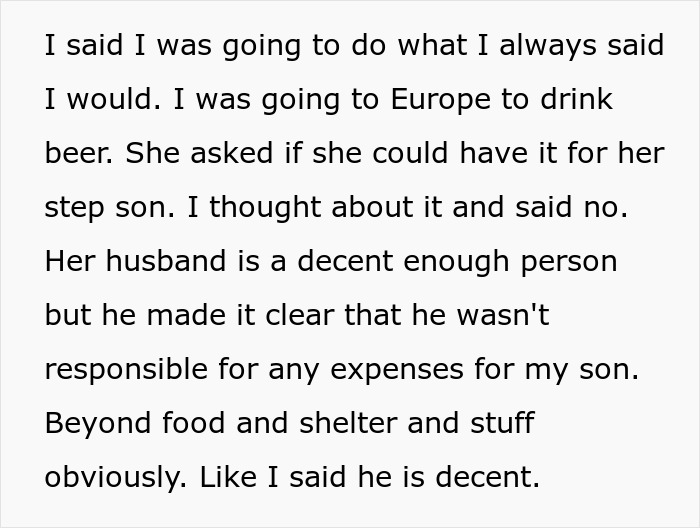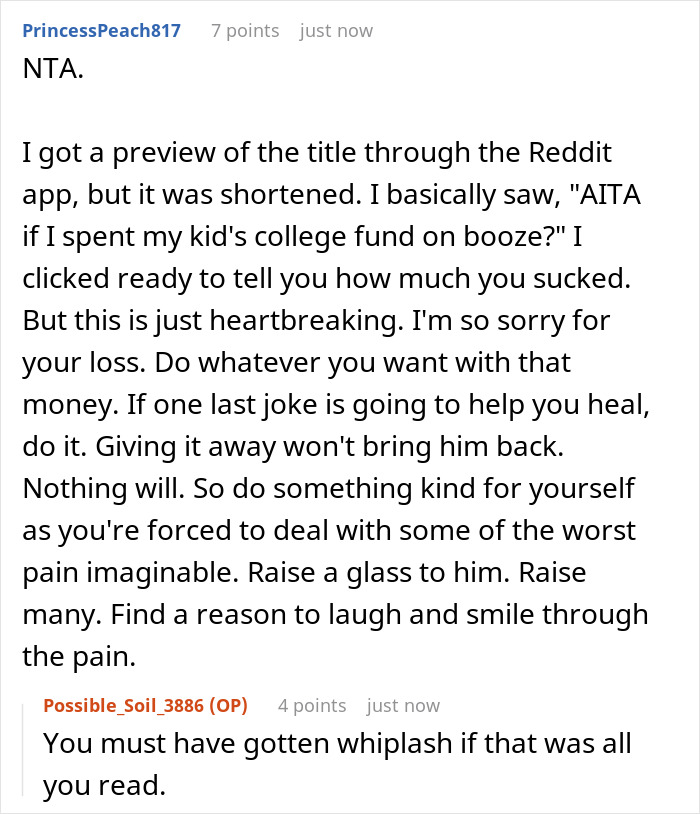Good parents will do their best to prepare something for their kids. In many places, this means setting aside funds to allow your offspring to go to whatever college they might want to attend. However, like any horde of money that is just “sitting around,” it can very quickly become a source of argument in the family.
A dad wondered if he was wrong to fulfill a promise he made his dead son, to use his college fund to go to Belgium for beer. We got in touch with the man in the story to learn more.
How a college fund is used can lead to some disagreements in a family

Image credits:Pavel Danilyuk (not the actual photo)
But one dad was called out by his ex-wife for using his dead son’s fund for a trip to Belgium







Image credits:1footage (not the actual photo)






Image credits:Possible_Soil_3886
We got in touch with the father in the story
Bored Panda got in touch with the father and he was kind enough to share more with us. “I was blown away by the response to my post. I was just looking for some insight into my situation. My wife and I will be leaving for Europe in about a week. I will be taking about a month to visit with family and work our way towards the monastery. Both of my grandfathers brought home wives from France after WWII so I have quite a few relatives there. I am putting off the beer until last because it is going to be hard and because I do not want to carry beer around Europe.”
“So many people offered to buy me a beer I laughed. Neither my liver nor my wife would be happy with me if I took them up on their offer. I asked instead that they enjoy a toast with me on the week of June 23rd. I love the idea that people all around the world are raising a glass for my son. I don’t blame my ex for asking for the money. Her stepson is a good kid. Their family moved to Montreal and the plan was for my son to live with them rather than commute from our city or live in dorms. Her husband is a good person who always treated my son with kindness and respect. Her stepson will be attending university this year as well and life is expensive. It turned out to be a moot point anyway. I could only give her the money I put in myself. RESPs are only transferable between siblings more or less,” he shared.
“I have the sourdough starter that I taught my son to make and I will be keeping it to use for bread and waffles. I like to think his love of the microscopic world started with yeast. If it is legal I may try to start some in Belgium.”
College funds can be the cause of a decent amount of drama
While in many places, a college education is somewhat available for anyone who gets in, North Americans, for example Canadians like the dad in the story or, more commonly, Americans, have to pay a pretty penny to attend. In Canada, tuition averages out to about C$20,000 to C$30,000, which is a bit less than many Americans might expect to pay.
In other words, this is not the sort of money most folks have laying around, so a fund, meticulously built over many years is the way to go. This is perhaps why the internet is littered with stories of families being ripped apart because someone suddenly has ideas for what to do with this pretty pile of cash.
However, the father in this story has very good reasons to hold on to the money. As he details in the comments (some of which can be found below), he was the actual contributor to the money, not his ex-wife. He also was pretty clear about what he would use the money for if his son didn’t end up going to college, which can be an issue in some families where the kid sees it as a “party fund.” Indeed, his intentions were entirely clear to everyone involved, so this wasn’t some greedy power play to pocket the money.
These beers are part of a long and storied tradition
For those who are not aware, these beers from Belgium are actually very, very special. Trappist beers are made by monks of the same name, a more simple term for monks in the Order of Cistercians of the Strict Observance. There are only thirteen monasteries worldwide, with only ten of the number bearing the official “Authentic Trappist Product” label.
This tradition goes back to the 17th century, which is a great pedigree for any beer. This originated as a way for monasteries to remain self-sufficient and not rely on the rest of the world for common goods. In 1997, the Trappist monasteries trademarked their beer under the Trappist brand, with pretty strict rules.
To qualify, a beer must be brewed within the walls of a Trappist monastery, either by the monks themselves or under their supervision. The brewery must be of secondary importance within the monastery and it should witness to the business practices proper to a monastic way of life. The brewery is not intended to be a profit-making venture. The income covers the living expenses of the monks and the maintenance of the buildings and grounds. Whatever remains is donated to charity for social work and to help persons in need.
It can be surprisingly hard to get a hold of these beers, as they are not crafted to meet what economists might call consumer demand. You are not likely to find them in your nearby craft beer store either. This is perhaps why so many people make a sort of beer pilgrimage to visit the actual monastery. So if this is something this man’s son would have liked, more power to him.
Some folks wanted more details





Most readers sided with the father
























